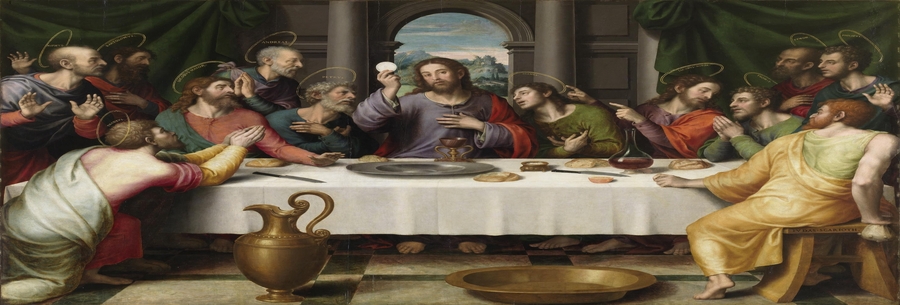The Fifth Luminous Mystery of the Rosary, entitled "The Institution of the Eucharist", is a central moment in the Christian faith. This event, recounted in the Gospels according to Matthew (26:26-29), Mark (14:22-25), Luke (22:19-20) and in the First Epistle to the Corinthians (11:23-26), marks the supreme gift of Jesus to his disciples and, by extension, to all humanity. Through the institution of the Eucharist, Jesus gives himself under the species of bread and wine, establishing a new pact of love and salvation.
The Context of the Institution
The institution of the Eucharist takes place at the Last Supper, the Passover meal that Jesus shares with his apostles on the eve of his passion. This Passover meal, full of symbolism for the Jewish people, commemorates Israel's liberation from slavery in Egypt. By choosing this moment to institute the Eucharist, Jesus gives new meaning to this celebration, inaugurating the new covenant between God and humanity.
The Words and Gestures of Jesus
During the meal, Jesus takes bread, pronounces a blessing, breaks it and gives it to his disciples, saying, "Take, eat, this is my body." Then he takes a cup of wine, gives thanks, and gives it to them, saying, "Drink from it, all of you, for this is my blood, the blood of the new and everlasting covenant, which will be poured out for you and for many for the forgiveness of sins." These words and gestures mean that Jesus gives himself as spiritual food and drink, his body and blood becoming a source of eternal life for those who believe in him.
The Meaning of the Eucharist
The Eucharist is the sacrament par excellence of the real presence of Jesus among his faithful. By receiving the body and blood of Christ, believers are united to him and to each other in a profound communion. This sacrament is a memorial of Jesus' sacrifice on the cross, making present in a mystical but real way his saving offering for the forgiveness of sins.
The Call to Communion and Unity
The institution of the Eucharist is also a call to communion and unity among Christians. By sharing the same bread and the same cup, the faithful form a single body in Christ. This Eucharistic unity transcends divisions and calls for a life of charity and solidarity towards all, especially those most in need.
The Spiritual Lessons
By meditating on this luminous mystery, we are invited to deepen our understanding and appreciation of the Eucharist. It reminds us of the immensity of Jesus' love, who gives himself entirely for our salvation. It calls us to approach the Eucharist with faith, reverence and gratitude, aware of the priceless grace we receive.
The Actuality of the Eucharist
The Eucharist remains at the heart of the Christian life, a constant source of grace, strength and spiritual renewal. It calls us to live in accord with what we receive, being witnesses to Christ's love in our daily lives. It invites us to be builders of peace and unity in our communities and in the world.
As we contemplate this mystery, let us ask God to rekindle our faith in the Eucharist, to strengthen our communion with Christ and with our brothers and sisters, and to transform us into living witnesses of his love in the world. May this sacrament, the source and summit of Christian life, lead us ever closer to God and inspire us to live according to the example of Jesus, in self-giving and service to others.




















